Keynotes and Master Lectures
Keynotes
Heather Cole-Lewis, PhD
When: Wednesday, March 26 at 4 p.m.
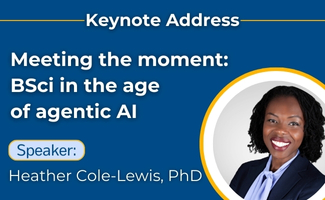
As AI systems become increasingly autonomous, they offer unprecedented opportunities to scale and personalize behavioral interventions in health. Dr Heather Cole-Lewis will explore how AI can amplify the impact of behavior science solutions while also examining how our scientific frameworks can and should be leveraged to ensure that these powerful tools promote equitable and positive outcomes that allow people to achieve health and wellbeing on their own terms.
Dr. Heather Cole-Lewis is passionate about improving health by understanding people in the context of their lives. She is an expert in the design and evaluation of digital health interventions, with a specific focus on maximizing impact using rapid iteration and unique combinations of methodologies from social science, human computer interaction, and data science. Dr. Cole-Lewis has led digital health efforts in multiple sectors- Tech, Pharma, MedTech, Consumer Packaged Goods, Startups, Government consulting, and Global Health Development, providing strategic business and scientific guidance on products, research, and partnerships that influence health.
Margaret A. Chesney, PhD, FSBM
When: Thursday, March 27 at 10 a.m.

Dr. Norman B. Anderson, who was an extraordinary leader, mentor, colleague, past president, and long-time member of the Society of Behavioral Medicine, passed unexpectedly on March 1, 2024. The Norman B. Anderson Keynote Address was established to honor the life, legacy, and profound impact that he had on the field of behavioral medicine. A special thank you to the generosity of our donors who helped make this tribute possible. Dr. Anderson had a wide-ranging career as a national leader, first as a scientist and tenured professor studying health disparities and mind/body health at Duke University, and then as the first director of the National Institutes of Health (NIH) Office of Behavioral and Social Sciences Research (OBSSR). He later served as CEO and Executive Vice President of the American Psychological Association. He fundamentally championed behavioral and social research in such areas as cancer, heart disease, diabetes, children’s health, minority health, and aging.
United States healthcare is in a crisis. The United States spends almost 17 percent of its gross domestic product on healthcare, the highest amount in the world, and yet life expectancy in the nation ranks low among developed countries, with a life expectancy of just 77.5 years. The U.S. healthcare system does not promote health or prevent disease. It offers treatment to those who are fortunate, but even then, addresses health by body systems. What is needed is what some have called “whole person health,” which directly relates to behavioral medicine. Just like behavioral medicine, whole person health considers the biopsychosocial aspects of health and calls for both empowering individuals with health-promoting behaviors and fostering health-supportive communities. Years ago, at SBM, lectures encouraged us to translate research into practice. Now, as our lifespan has stalled and so many are going without, Margaret A. Chesney, PhD, FSBM, asks us: Is it time to translate our research beyond practice to implementation?
Dr. Chesney is a Distinguished Professor in Residence in the Department of Medicine at the University of California San Francisco (UCSF). Dr. Chesney initially joined the School of Medicine in 1987, and served in a number of leadership positions at the university. She took a leave of absence from UCSF to gain experience working at the NIH, with assignments in the Office of Women's Health and OBSSR. In addition, she served as the Deputy and Acting Director of the NIH National Center for Complementary and Integrative Health.
Ellen Beckjord, PhD, MPH, FSBM
When: Thursday, March 27 at 4 p.m.
Proudly Sponsored By UPMC

Individual-level interventions to support health are often at odds with contextual factors that create momentum against health. SBM President Ellen Beckjord, PhD, MPH, FSBM, will share perspectives on contextual factors within the healthcare system as well as the product and information environments that can work against health and will discuss examples of strategies that have successfully transcended these challenges.
Dr. Beckjord has worked in the field of behavioral medicine for 25 years as a researcher, provider (clinical psychologist), and business executive. Her areas of expertise include digital interventions for health behavior change, design and implementation of evidence-based behavioral medicine interventions, and large-scale clinical operators for health promotion.
Steve Downs, MS
When: Friday, March 28 at 10 a.m.

The “product environment” — the collection of products and services from the entertainment, food, transportation, and other industries, with which people interact with regularly — is a major driver of health behaviors. For the last five years, Building H has been working to catalyze a shift in the product environment toward a healthier impact. Building H Co-Founder Steve Downs, MS, will describe these efforts and the lessons learned from taking on such a large systemic challenge.
Mr. Downs has over 20+ years of public health experience, working on national-level strategies to halt chronic disease epidemics in the United States (at the Robert Wood Johnson Foundation and Public Health Institute).
Bradford W. Hesse, PhD, FSBM
When: Friday, March 28 at 4 p.m.
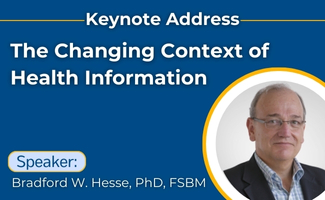
One of the most significant contextual factors affecting behavioral medicine is the rapid pace of change within the surrounding health information environment. The technologies, content, and mores associated with the health information context can exert a substantive influence on the ability of individuals to make healthy decisions for themselves and their loved ones; they can define capacity for a public health system striving to detect and respond to health emergencies; they can serve to bolster or threaten the effectiveness of our health care delivery systems; and they can accelerate of delay the pace of funding and discovery within the scientific community. Come join a discussion of how the health information environment has changed since the inception of SBM: from early waves of hope and promise, to what has become a deluge of cacophonous signal and intentional disinformation; to what still promises to be the broadest palette for intervention delivery available to the SBM membership since its beginning.
Dr. Hesse, has spent his career focusing on bringing the power of evidence-based health communication to bear on the problem of eliminating death and suffering from cancer. Dr. Hesse served as Chief of the Health Communication and Informatics Research Branch within the Behavioral Research Program at the National Cancer Institute (NCI) from 2003 until 2018. He has authored or co-authored close to 200 publications, including peer-reviewed articles, technical reports, books, and book chapters.
Panel
When: Saturday, March 29 at 10 a.m.

In response to recent policy shifts affecting scientific research, a panel of former SBM Presidents will share their insights on navigating challenging times with resilience. Drawing from their extensive academic and leadership experience, panelists will address member-submitted questions about policy changes, while reflecting on pivotal moments from their own career journeys. The session aims to provide attendees with a strengthened sense of community, and a renewed focus on their resilience as they face challenges in their professional journeys.
Master Lectures
Jamy Ard, MD, and Michelle Cardel, PhD, MS, RD
When: Friday, March 28 at 2 p.m.
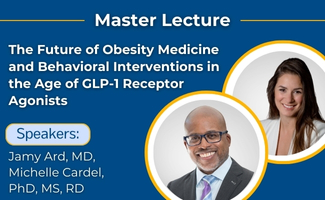
This session will explore the transformative impact of GLP-1 receptor agonists on obesity care within the evolving field of behavioral medicine. Drs. Jamy Ard and Michelle Cardel will have a dialogue that examines the integration of pharmacotherapy innovations with behavioral interventions, emphasizing their implications for advancing comprehensive, patient-centered approaches in obesity and weight management.
Jamy Ard, MD, is a clinician scientist that does research in the management of obesity, including use of anti-obesity medication. His work has focused on developing and testing medical strategies for the treatment of obesity in special populations, including African Americans, those with type 2 diabetes, and older adults. Dr. Ard is Co-Director of the Advocate Health Wake Forest Baptist Weight Management Center. He is also a Professor in the Department of Epidemiology and Prevention and Vice Dean for Clinical Research at Wake Forest University School of Medicine.
Michelle Cardel, PhD, MS, RD, researches the development and implementation of evidence-based healthy lifestyle strategies for adults and children, with a particular focus on those from medically underserved backgrounds. Dr. Cardel is Chief Nutrition Officer at WW International, Inc. She is also a faculty member at the University of Florida, where she is a co-Director of the Center for Integrative Cardiovascular & Metabolic Disease.
Lorna H. McNeill, MPH, PhD, FSBM
When: Thursday, March 27 at 2 p.m.
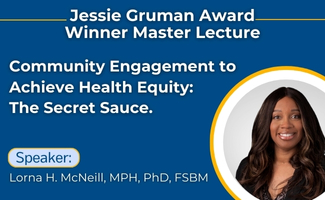
In this lecture, Lorna H. McNeill, MPH, PhD, FSBM, will share her history and work over the years with community members and organizations on various health- and cancer-related topics, what she learned about how to engage successfully and build trust, and how this formula can help achieve health equity.
Dr. McNeill is Professor and Chair of the Department of Health Disparities Research at MD Anderson Cancer Center. Her research has particular emphasis on understanding the influence of social contextual determinants of cancer in minorities, such as social support, racial discrimination, and neighborhood environment—multilevel influences on health. She is a behavioral interventionist having conducted several multilevel interventions in minority and underserved communities with excess cancer death rates, both at the individual and structural levels, in public housing developments, African American churches, community-based clinics, and low-income neighborhoods where we intervene at the organizational level. Dr. McNeill was the recipient of SBM's 2024 Jessie Gruman Award for Health Engagement.
Eric Hekler, PhD, FSBM
When: Thursday, March 27 at 2 p.m.
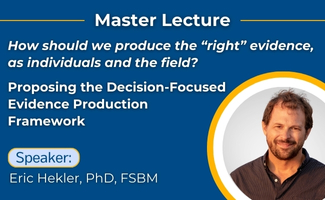
Just as the promise of just-in-time adaptive interventions is to provide the “right” type of support, at the “right” time, in the “right” context, for each person, there is a need for selecting the “right” research methods to align evidence production with the priorities of those using the evidence, their context, and their constraints. The purpose of this talk from Eric Hekler, PhD, FSBM, is to propose the decision-focused evidence production framework as an organizing structure to guide the production of evidence across the field of behavioral medicine research.
Dr. Hekler is a transdisciplinary methodologist focused on developing research methods and processes for designing, optimizing, evaluating, and monitoring useful and usable behavioral and community interventions. Dr. Heckler's mission is to advance methods and processes that equitably serve people and practice towards a more vital, just, and resonantly diverse society and the planet. Dr. Hekler is Professor and Associate Dean, Community Partnerships, and Director of the T32 Training on Advanced Data Science for the Social and Behavioral Science, in the Herbert Wertheim School of Public Health and Human Longevity Science in the University of California, San Diego (UCSD), the Director of the Center for Wireless & Population Health Systems within the Qualcomm Institute at UCSD, and Director of the Design Specialization within the Design Lab at UCSD.
Kim Lavoie, PhD
When: Friday, March 28 at 2 p.m.

Many of the world's most pressing challenges (e.g., preventing communicable and noncommunicable diseases, increasing vaccine uptake, combating climate change) involve understanding and modifying individual and collective human behaviors. While the science of human behavior is the expertise of behavioral scientists, most of these challenges have fallen within the domain of public health, who do not always perceive our science as relevant to population-level interventions (and may even be resistant to our approaches). This presentation from Kim Lavoie, PhD, will describe the extant challenges and controversies involved in strengthening our collaborations with public health/policy makers, and the opportunities this presents for addressing all the global challenges that involve changing human behavior.
Dr. Lavoie is a Professor and Canada Research Chair in Behavioral Medicine at the University of Quebec at Montreal. Dr. Lavoie is the Co-Director of the Montreal Behavioral Medicine Centre and lead several national and international networks (IBTN, CBITN, CAN-Change). She is internationally recognized for her research on chronic disease prevention (with a focus on heart, lung and metabolic diseases) and the impact of behavioral interventions, such as motivational communication, on health behaviors and chronic disease outcomes. Dr. Lavoie was the recipient of SBM's 2024 Distinguished Scientist Award.

